动词的时态和语态
高中语法动词的时态和语态

一、一般现在时1、表示经常发生的习惯性的、现在反复出现的动作或状态,常用的时间状语有:always,usually,seldom, sometimes, every day, now and then, once a week等。
2、表示眼下或目前等现在时间所发生的动作或存在的状态,这种状态带有一定的持续性。
3、表示客观事实或普遍真理。
4、书报的标题,故事的叙述,小说、戏剧、电影等情节介绍,图片的说明等。
5、时间表、时刻表、日程表、节目单、课程表等按规定将要发生的动作,只限于go, arrive, leave, start, stay, return, begin, come等动词。
6、在时间、条件、方式、让步状语从句中,表示将来的动作。
注意:一般现在时可以用于定语从句或宾语从句中表示将来。
7、用在某些表达中,表示现在正在发生的动作或存在的状态。
Here comes the bus!How it rains!二、一般过去时1、表示在过去某一时间点发生的动作或所处的状态,与现在没有关系。
常用的时间状语有:yesterday, last night, at that time等。
2、表示在过去某一段时间里反复出现的动作或状态,与现在没有关系。
3、用used to do或would do表示过去经常或反复发生的动作。
4、有些情况发生的时间没清楚表明,但实际上是“刚才,刚刚”发生的,属于过去时间,应使用过去时态。
常见的有I didn’t know…或I forgot…等。
5、一般过去时可与today, this week, this month等时间状语连用。
三、一般将来时1、will/shall do(1)表示将来会出现的动作或状态。
常用的时间状语:this evening, tomorrow, next week/month…,at the end of this term, in a few minutes等。
什么是动词的时态和语态
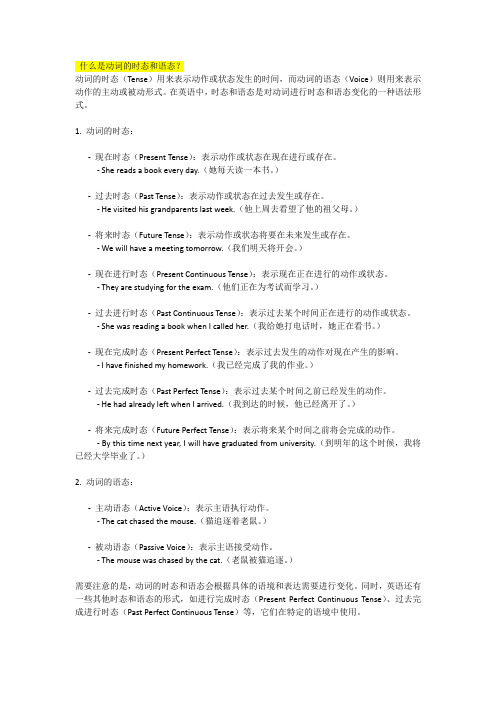
什么是动词的时态和语态?动词的时态(Tense)用来表示动作或状态发生的时间,而动词的语态(Voice)则用来表示动作的主动或被动形式。
在英语中,时态和语态是对动词进行时态和语态变化的一种语法形式。
1. 动词的时态:-现在时态(Present Tense):表示动作或状态在现在进行或存在。
- She reads a book every day.(她每天读一本书。
)-过去时态(Past Tense):表示动作或状态在过去发生或存在。
- He visited his grandparents last week.(他上周去看望了他的祖父母。
)-将来时态(Future Tense):表示动作或状态将要在未来发生或存在。
- We will have a meeting tomorrow.(我们明天将开会。
)-现在进行时态(Present Continuous Tense):表示现在正在进行的动作或状态。
- They are studying for the exam.(他们正在为考试而学习。
)-过去进行时态(Past Continuous Tense):表示过去某个时间正在进行的动作或状态。
- She was reading a book when I called her.(我给她打电话时,她正在看书。
)-现在完成时态(Present Perfect Tense):表示过去发生的动作对现在产生的影响。
- I have finished my homework.(我已经完成了我的作业。
)-过去完成时态(Past Perfect Tense):表示过去某个时间之前已经发生的动作。
- He had already left when I arrived.(我到达的时候,他已经离开了。
)-将来完成时态(Future Perfect Tense):表示将来某个时间之前将会完成的动作。
- By this time next year, I will have graduated from university.(到明年的这个时候,我将已经大学毕业了。
动词时态与语态总结

动词时态与语态总结动词时态和语态是英语语法中的重要概念,准确运用时态和语态可以使语言更加准确、流畅。
本文将对动词时态和语态进行总结和归纳,帮助读者更好地掌握这方面的知识。
一、动词时态1. 一般现在时(Simple Present Tense)一般现在时表示经常性、习惯性或普遍真理的动作或状态。
句子结构为主语+动词原形。
Example: She dances every evening.(她每天晚上跳舞。
)2. 一般过去时(Simple Past Tense)一般过去时表示过去发生的动作或状态。
句子结构为主语+动词过去式。
Example: They went to the park yesterday.(昨天他们去了公园。
)3. 一般将来时(Simple Future Tense)一般将来时表示将来发生的动作或状态。
句子结构为主语+will/shall+动词原形。
Example: I will travel to London next week.(我下周将去伦敦。
)4. 现在进行时(Present Continuous Tense)现在进行时表示现在正在进行的动作。
句子结构为主语+be动词+动词-ing形式。
Example: She is studying at the library.(她正在图书馆学习。
)5. 过去进行时(Past Continuous Tense)过去进行时表示过去某个时间正在进行的动作。
句子结构为主语+was/were+动词-ing形式。
Example: They were having dinner when the phone rang.(电话响时,他们正在吃晚饭。
)6. 将来进行时(Future Continuous Tense)将来进行时表示将来某个时间正在进行的动作。
句子结构为主语+will/shall+be+动词-ing形式。
Example: We will be waiting for you at the airport tomorrow.(明天我们将在机场等你。
英语动词时态和语态
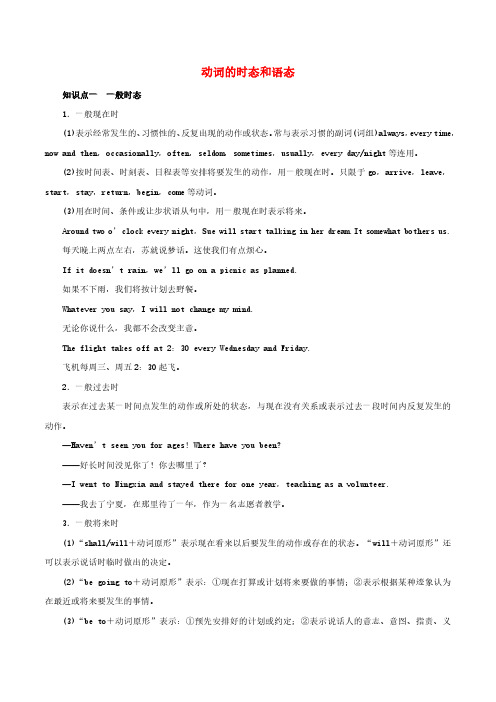
动词的时态和语态知识点一一般时态1.一般现在时(1)表示经常发生的、习惯性的、反复出现的动作或状态。
常与表示习惯的副词(词组)always,every time,now and then,occasionally,often,seldom,sometimes,usually,every day/night等连用。
(2)按时间表、时刻表、日程表等安排将要发生的动作,用一般现在时。
只限于go,arrive,leave,start,stay,return,begin,come等动词。
(3)用在时间、条件或让步状语从句中,用一般现在时表示将来。
Around two o’clock every night,Sue will start talking in her dream.It somewhat bothers us.每天晚上两点左右,苏就说梦话。
这使我们有点烦心。
If it doesn’t rain,we’ll go on a picnic as planned.如果不下雨,我们将按计划去野餐。
Whatever you say,I will not change my mind.无论你说什么,我都不会改变主意。
The flight takes off at2:30every Wednesday and Friday.飞机每周三、周五2:30起飞。
2.一般过去时表示在过去某一时间点发生的动作或所处的状态,与现在没有关系或表示过去一段时间内反复发生的动作。
—Haven’t seen you for ages!Where have you been?——好长时间没见你了!你去哪里了?—I went to Ningxia and stayed there for one year,teaching as a volunteer.——我去了宁夏,在那里待了一年,作为一名志愿者教学。
3.一般将来时(1)“shall/will+动词原形”表示现在看来以后要发生的动作或存在的状态。
动词的时态与语态变化

动词的时态与语态变化动词是语言中的重要组成部分,通过时态与语态的变化,我们可以清晰地表达出事件发生的时间和态度。
时态指的是动作或状态发生的时间,分为过去、现在和将来三个时态。
而语态则表示动作的主体与客体之间的关系,主要分为主动语态和被动语态。
在语言表达中,正确运用动词的时态和语态变化是非常重要的,下面将从几个方面详细介绍动词的时态与语态变化。
一、动词的时态变化1. 过去时态(Past Tense)过去时态用于表示已经发生或已经完成的动作或状态。
动词的过去时态一般由动词原形后加上-ed结尾来构成,例如:- I walked to school yesterday.(昨天我走路去学校。
)- She cooked dinner for her family last night.(她昨晚为家人做饭。
)2. 现在时态(Present Tense)现在时态用于表示正在发生或经常性发生的动作或状态。
动词的现在时态一般由动词原形来表示,例如:- They play tennis every Sunday.(他们每个星期天打网球。
)- The sun rises in the east.(太阳从东方升起。
)3. 将来时态(Future Tense)将来时态用于表示将要发生的动作或状态。
动词的将来时态一般由助动词will或shall加上动词原形构成,例如:- We will go on a trip next week.(下周我们将去旅行。
)- She shall study hard for the exam.(她将为考试努力学习。
)二、动词的语态变化1. 主动语态(Active Voice)主动语态表示主语是动作的执行者或实施者。
在主动语态中,主语在句子中承担着主要的语法成分,动词根据主语的人称和数的变化而变化。
例如:- They built a new house.(他们建了一座新房子。
)- She writes articles for a magazine.(她为一家杂志写文章。
动词时态和语态
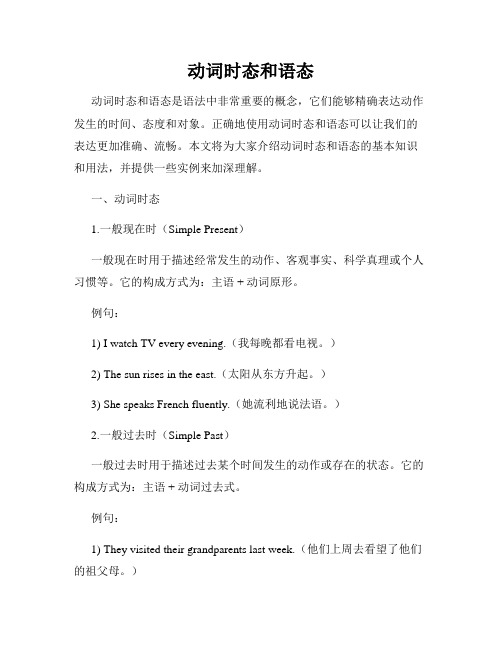
动词时态和语态动词时态和语态是语法中非常重要的概念,它们能够精确表达动作发生的时间、态度和对象。
正确地使用动词时态和语态可以让我们的表达更加准确、流畅。
本文将为大家介绍动词时态和语态的基本知识和用法,并提供一些实例来加深理解。
一、动词时态1.一般现在时(Simple Present)一般现在时用于描述经常发生的动作、客观事实、科学真理或个人习惯等。
它的构成方式为:主语 + 动词原形。
例句:1) I watch TV every evening.(我每晚都看电视。
)2) The sun rises in the east.(太阳从东方升起。
)3) She speaks French fluently.(她流利地说法语。
)2.一般过去时(Simple Past)一般过去时用于描述过去某个时间发生的动作或存在的状态。
它的构成方式为:主语 + 动词过去式。
例句:1) They visited their grandparents last week.(他们上周去看望了他们的祖父母。
)2) I lived in London for five years.(我在伦敦生活了五年。
)3) He didn't finish his homework yesterday.(他昨天没完成作业。
)3.一般将来时(Simple Future)一般将来时用于描述将要发生的动作或存在的状态。
它的构成方式为:主语 + will + 动词原形。
例句:1) I will call you later.(我过会儿会给你打电话。
)2) They will travel to Japan next month.(他们下个月会去日本旅行。
)3) She won't be here tomorrow.(她明天不会在这里。
)4.现在进行时(Present Continuous)现在进行时用于描述当前正在进行的动作。
它的构成方式为:主语+ am/is/are + 动词-ing。
动词的时态和语态

【翻译句子】 (7) He told me he read an interesting novel last night. 他告诉我他昨晚看了一本有趣的小说。 【结论2】如果从句中有一个过去的时间状语,尽 管从句中的动作先于主句发生,但从句中的谓语动 词仍用过去式。 【结论3】表示两个紧接着发生的动作,常由以下 词语连接,用一般过去时。常见连词有:but, and, when, as soon as, immediately, the moment, the minute。 如 : He rushed into the room and sat down immediately.
【疑难2】 We had no sooner been seated than the bus started. = No sooner had we been seated than the bus started. 【疑难剖析2】hardly / scarcely…when (before);no sooner…than表示“一……就……”。
3. 一般将来时 【翻译句子】 (8)我们下周将会讨论这个话题。 We will talk about this topic next week. 【结论1】表示未来的动作或状态常用will / shall + 动词(常与表示将来的时间状语连用,如tomorrow, next week等)。
【翻译句子】 (9) The bus is coming. 公共汽车就要到了。 【结论2】表示一种趋向或习惯动作。表示趋向行 为的动词,如come,go,start,begin,leave等词, 常用进行时的形式表示将来时。
【疑难2】The room remains clean. You are allowed to speak here. 【疑难剖析2】下面四类动词不宜用现在进行时: a. 表示心理状态、情感的动词:like, love, hate, care, remember, believe, want, mind, wish, agree, mean, need。 b. 表存在的状态的动词:appear, exist, lie, remain, seem, belong to, depend on。 c. 表示瞬间动作的动词:allow, accept, permit, promise, admit, complete。 d. 表示感官的动词:see, hear, notice, feel, smell, sound, taste, look。
动词的时态与语态

动词的时态和语态一.动词的时态1.一般现在时(1)表示现在经常性或习惯性的动作。
Sometimes we often play basketball after school.(2) 表示某种永恒的事实或普遍真理。
The earth moves round the sun.(3) 在if, unless, when, until, after, before, as soon as, the moment等连词引导的表示时间或条件的从句中用一般现在时表示将来。
I will tell him all about it as soon as (the moment) he comes back.2. 现在进行时(1)现在进行时表示目前或现阶段正在进行的动作或发生的事情。
We are eating more now.(2) 与频率副词always, constantly, continually, often, all the time, again等连用表示说话人的某种感情色彩(赞叹,厌烦,埋怨等)He is always helping others.My younger brother is constantly losing keys.(3) 表示将来,近期安排的按计划要进行的事情(往往有一个表示将来的时间状语),常用的动词有come, go, leave, start, arrive, return, work, play, stay等。
Are you staying here till next week?Mary is leaving on Friday.3.现在完成时现在完成时表示动作发生在过去,但强调与现在情况仍有联系,其结果或影响仍存在。
(1)for+时间段,since+时间点They have lived in Beijing for five years.(2) 常见的时间状语:lately, recently, just, already, yet, up to now,till now, so far, these days. in the past few------, over the past few----, throughout centuries, throughout histories.So far(up till now) I have only read half the story.I haven’t seen much of him recently.(these days)(3) 表示“第几次做某事”It\This\That is thefirst\second\third---time that 或在It\This is the best \worst\most interesting +名词+that后面跟现在完成时。
动词的时态和语态

动词的时态和语态时态和语态是语法中非常重要的概念,在句子中用来表达时间和动作主体的关系。
时态表示动作发生的时间,而语态则表示动作主体与动作之间的关系。
在英语中,时态和语态的正确运用对于准确表达意思至关重要。
一、动词的时态时态是指动作发生的时间,根据发生的时间可以划分为一般过去时、一般现在时、一般将来时等。
下面将分别介绍这几种时态的用法。
1. 一般过去时一般过去时表示过去某个时间发生的动作或存在的状态。
例如:- I went to the park yesterday.(我昨天去了公园。
)- She studied English for three hours last night.(她昨晚学了三个小时的英语。
)2. 一般现在时一般现在时表示现在经常发生的动作、全面性的真理、客观存在的事实等。
例如:- He usually plays basketball on weekends.(他通常在周末打篮球。
)- Water boils at 100 degrees Celsius.(水在100摄氏度时煮沸。
)3. 一般将来时一般将来时表示将来某个时间要发生的动作或存在的状态。
例如:- I will visit my grandparents next month.(我下个月会去看望我的祖父母。
)- They are going to have a party tomorrow.(他们明天要开派对。
)二、动词的语态语态是指动作主体与动作之间的关系,根据动作主体的不同可以分为主动语态和被动语态。
1. 主动语态主动语态表示主语是动作的执行者。
例如:- She wrote an article for the newspaper.(她为报纸写了一篇文章。
)- They are building a new house.(他们正在建一所新房子。
)2. 被动语态被动语态表示主语是动作的承受者。
例如:- The book was written by Mark Twain.(这本书是马克·吐温写的。
动词的时态和语态
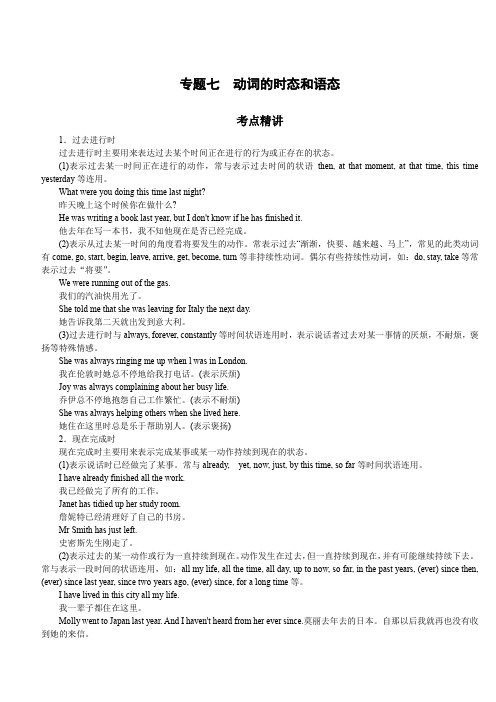
专题七动词的时态和语态考点精讲1.过去进行时过去进行时主要用来表达过去某个时间正在进行的行为或正存在的状态。
(1)表示过去某一时间正在进行的动作,常与表示过去时间的状语then, at that moment, at that time, this time yesterday等连用。
What were you doing this time last night?昨天晚上这个时候你在做什么?He was writing a book last year, but I don't know if he has finished it.他去年在写一本书,我不知他现在是否已经完成。
(2)表示从过去某一时间的角度看将要发生的动作。
常表示过去“渐渐,快要、越来越、马上”,常见的此类动词有come, go, start, begin, leave, arrive, get, become, turn等非持续性动词。
偶尔有些持续性动词,如:do, stay, take等常表示过去“将要”。
We were running out of the gas.我们的汽油快用光了。
She told me that she was leaving for Italy the next day.她告诉我第二天就出发到意大利。
(3)过去进行时与always, forever, constantly等时间状语连用时,表示说话者过去对某一事情的厌烦,不耐烦,褒扬等特殊情感。
She was always ringing me up when l was in London.我在伦敦时她总不停地给我打电话。
(表示厌烦)Joy was always complaining about her busy life.乔伊总不停地抱怨自己工作繁忙。
(表示不耐烦)She was always helping others when she lived here.她住在这里时总是乐于帮助别人。
英语语法中的动词时态和语态

英语语法中的动词时态和语态动词时态和语态是英语语法中非常重要的概念。
时态表示动作发生的时间,而语态则表示动作的主动与被动关系。
掌握好动词时态和语态的使用,可以帮助我们更准确地表达自己的意思,提高英语写作和口语表达的能力。
一、动词时态1. 现在时态现在时态用来表示现在正在进行的动作或状态。
例如:I am writing an article.(我正在写一篇文章。
)2. 过去时态过去时态用来表示过去发生的动作或状态。
例如:She studied English last night.(昨晚她学习了英语。
)3. 将来时态将来时态用来表示将来要发生的动作或状态。
例如:We will go to the beach tomorrow.(我们明天要去海滩。
)4. 现在完成时态现在完成时态用来表示过去发生的动作对现在产生的影响或结果。
例如:I have finished my homework.(我已经完成了作业。
)5. 过去完成时态过去完成时态用来表示过去某一时间点之前已经完成的动作。
例如:She had already left when I arrived.(当我到达时,她已经离开了。
)6. 将来完成时态将来完成时态用来表示将来某一时间点之前将会完成的动作。
例如:By theend of this month, I will have graduated from university.(到本月底,我将已经从大学毕业了。
)二、动词语态1. 主动语态主动语态表示主语是动作的执行者。
例如:He wrote a letter.(他写了一封信。
)2. 被动语态被动语态表示主语是动作的承受者。
例如:The letter was written by him.(这封信是他写的。
)动词的时态和语态的正确使用对于表达准确的意思至关重要。
下面是一些使用动词时态和语态的注意事项:1. 时态的一致性在一篇文章或一句话中,时态应该保持一致,不要随意变换时态,以免造成混淆。
动词的时态和语态

动词的时态和语态一、一般现在时1、表示经常发生的习惯性的、现在反复出现的动作或状态,常用的时间状语有:always,usually,seldom, sometimes, eve ry day, now and then, once a week等。
2、表示眼下或目前等现在时间所发生的动作或存在的状态,这种状态带有一定的持续性。
3、表示客观事实或普遍真理。
4、书报的标题,故事的叙述,小说、戏剧、电影等情节介绍,图片的说明等。
5、时间表、时刻表、日程表、节目单、课程表等按规定将要发生的动作,只限于go, arrive, leave, start, stay, return, begin, come等动词。
6、在时间、条件、方式、让步状语从句中,表示将来的动作。
注意:一般现在时可以用于定语从句或宾语从句中表示将来。
7、用在某些表达中,表示现在正在发生的动作或存在的状态。
Here comes the bus!How it rains!二、一般过去时1、表示在过去某一时间点发生的动作或所处的状态,与现在没有关系。
常用的时间状语有:yesterday, last night, at that time等。
2、表示在过去某一段时间里反复出现的动作或状态,与现在没有关系。
3、用used to do或would do表示过去经常或反复发生的动作。
4、有些情况发生的时间没清楚表明,但实际上是“刚才,刚刚”发生的,属于过去时间,应使用过去时态。
常见的有I didn’t know…或I forgot…等。
5、一般过去时可与today, this week, this month等时间状语连用。
三、一般将来时1、will/shall do(1)表示将来会出现的动作或状态。
常用的时间状语:this evening, tomorrow, next week/month…,at the end of this term, in a few minute s等。
动词的时态和语态

动词的时态和语态时态(Time)是指动词的形式来表达动作或状态所发生的时间。
语态(Voice)是指动词的形式来表达主语与动作的关系,包括主动语态和被动语态两种。
一、动词的时态动词的时态分为以下几种:一般现在时、一般过去时、一般将来时、现在进行时、过去进行时、将来进行时、现在完成时、过去完成时、将来完成时等。
1. 一般现在时一般现在时表示经常性、习惯性或普遍性的动作或状态。
它的构成为主语 + 动词原形。
例如:- I eat breakfast every day. (我每天吃早餐。
)- The sun rises in the east. (太阳从东方升起。
)2. 一般过去时一般过去时用于表示过去发生的动作或状态。
它的构成为主语 + 动词的过去式。
例如:- She studied abroad last year. (她去年出国留学。
)- We visited our grandparents yesterday. (我们昨天去拜访了祖父母。
)3. 一般将来时一般将来时表示将来要发生的动作或状态。
它的构成为主语 +will/shall + 动词原形。
例如:- They will arrive at the airport tomorrow. (他们明天将到达机场。
)- I shall finish my homework before dinner. (我将在晚餐前完成作业。
)4. 现在进行时现在进行时表示现在正在进行的动作或状态。
它的构成为主语 + am/is/are + 动词-ing 形式。
例如:- He is watching TV at the moment. (他此刻正在看电视。
)- We are studying for the exam. (我们正在复习考试。
)5. 过去进行时过去进行时表示过去某一时刻正在进行的动作或状态。
它的构成为主语 + was/were + 动词-ing 形式。
动词的时态和语态

第九讲动词的时态和语态Ⅰ动词的时态英语中不同时间和方式发生的动作或状态时要用谓语动词的不同形式来表示,这种表示动作或状态发生时间和方式的形式称作动词时态。
一一般现在时一般现在时主要用来表示每天、每周等经常一直如此,长期进行下去的动作,其着眼点不在描述具体的动作,而是通过提出不断反复的动作,来说明某一真理或某一经常性习惯性的举动。
一般现在时的几种主要用法。
1)一般现在时表示客观事实、客观存在的普遍真理、用于一般现在时的时间状语常见的有:often,usually,always,sometimes,seldom,ever,never,everyday(week,month,year,) once a year,now and then,from time to time.Eg:The earth moves around the sun.Shanghai lies in the east of China.2)表示格言或警句。
Eg:Pride goes before a fall.(骄者必败)注意:此用法如果出现在宾语从句中,即使主语是过去时,从句谓语也要用一般现在时。
Eg:Columbus proved that the earth is round.3)表示现在习惯的、经常重复的或定期发生的动作或存在的状态。
Eg:I leave home for school at 7 every morning.We go to school every day except on Sunday.4)表示能力、性格、个性等。
Eg:I do not know so much.Ann writes good English but does not speak English well.注意:1)表示“感觉”“状态”或“关系”的动(如:be ,like,love,hate,want,think,remember,find,sound,forget, Refuse,see,allow,prove,have,matter,taste,look,feel)常用一般现在时,不用现在进行时。
动词的时态和语态

6.现在完成时:have/has been+过去分词 The classroom has been cleaned . 7.过去完成时:had been+过去分词 When we got there, the classroom had been cleaned . 8.含情态动词的被动语态:表示某动作可能、 应该、必须被做(情态动词+be+过去分词) The classroom must be cleaned every day
8.现在完成进行时: 助动词have/has+ been+v-ing We have been learning English for four years.
*表示状态用be+表语(常用名词或形容词)。
1.现在的状态:am, is, are+表语: I am a student. He is my classmate. 2.过去的状态:was, were+表语: I was 16 last year. They were my classmates. 3.将来的状态:will be+表语: He will be a teacher next year.
3.一般将来时: (1) 助动词will/shall+动词原形: (2)be going to+动词原形: He will play basketball tomorrow. He is going to play basketball tomorrow.
4.现在进行时:助动词am/is/are+v-ing He is playing basketball now.
5.过去进行时:助动词was/were+v-ing He was playing basketball at ten yesterday.
动词的语态与时态

一.动词的时态和语态动词的时态英语中表示不同时间发生的动作或存在的状态,需用不同的动词形式表示,这种不同的动词形式称为时态(Tense)。
高中阶段我们需掌握十一种时态的用法。
一.一般现在时(1)表示现在经常发生或习惯性的动作或状态,常与usually, always,sometimes, every day, once a week等时间状语连用。
(2)在时间,条件状语从句中表将来的动作。
e.g. The volleyball match will be put off if it rains. (表示将来)如果下雨,排球赛将推迟。
(3)主句中的谓语动词是过去时态,但宾语从句中如果所说的是客观真理,它的谓语动词用一般现在时。
e.g. The teacher told us that the moon goes around the earth.(4)表示安排或计划好的将来动作(只限于少数几个动词:go, come, start, leave等)。
e.g. The summer holidays begin next week. 暑假从下周开始。
School begins the day after tomorrow. 后天开学。
The plane takes off at 2:00 in the afternoon. 飞机下午两点起飞。
(5)在新闻标题,小说和电影以及戏剧情节介绍中常用一般现在时。
e.g. American Ambassador leaves Beijing. 美国大使离京(新闻标题)。
二. 现在进行时(1)表示说话人说话时正在进行的动作,译成汉语“正在”。
这一用法常和表示此刻的时间状语连用,如now, at the moment, at present等。
e.g. It's raining hard now.天正在下大雨。
(2)表示现阶段而并非归眼下(此刻)正在进行着的动作。
重点归纳:动词的时态和语态
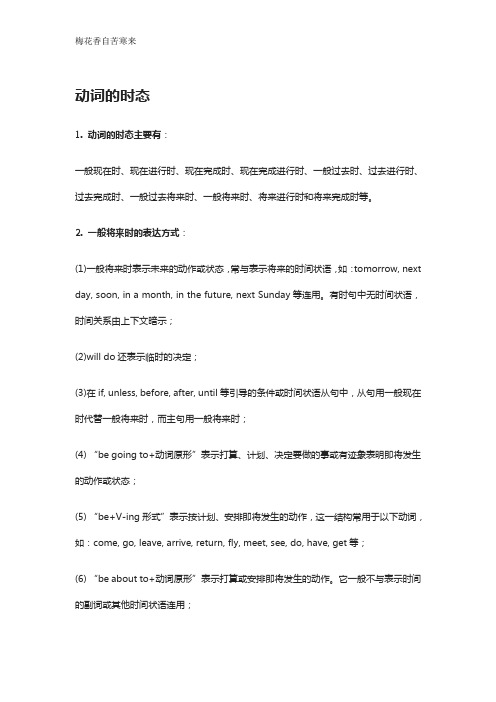
动词的时态1. 动词的时态主要有:一般现在时、现在进行时、现在完成时、现在完成进行时、一般过去时、过去进行时、过去完成时、一般过去将来时、一般将来时、将来进行时和将来完成时等。
2. 一般将来时的表达方式:(1)一般将来时表示未来的动作或状态,常与表示将来的时间状语,如:tomorrow, next day, soon, in a month, in the future, next Sunday等连用。
有时句中无时间状语,时间关系由上下文暗示;(2)will do还表示临时的决定;(3)在if, unless, before, after, until等引导的条件或时间状语从句中,从句用一般现在时代替一般将来时,而主句用一般将来时;(4) “be going to+动词原形”表示打算、计划、决定要做的事或有迹象表明即将发生的动作或状态;(5) “be+V-ing形式”表示按计划、安排即将发生的动作,这一结构常用于以下动词,如:come, go, leave, arrive, return, fly, meet, see, do, have, get等;(6) “be about to+动词原形”表示打算或安排即将发生的动作。
它一般不与表示时间的副词或其他时间状语连用;(7) “be to+动词原形”表示按计划、安排即将发生的动作;(8) 一般现在时表示按时刻表或根据规定将要发生的动作,这一结构常用于表示位移的动词,如:come, go, leave, start, begin, take off, set off等。
动词的语态1. 一般现在时的被动语态:is/am/are+V-ed。
例如:English is widely spoken all over the world.2. 一般过去时的被动语态:was/were+V-ed。
例如:The underground was built five years ago.3. 一般将来时的被动语态:①will/shall be+V-ed。
动词的时态和语态
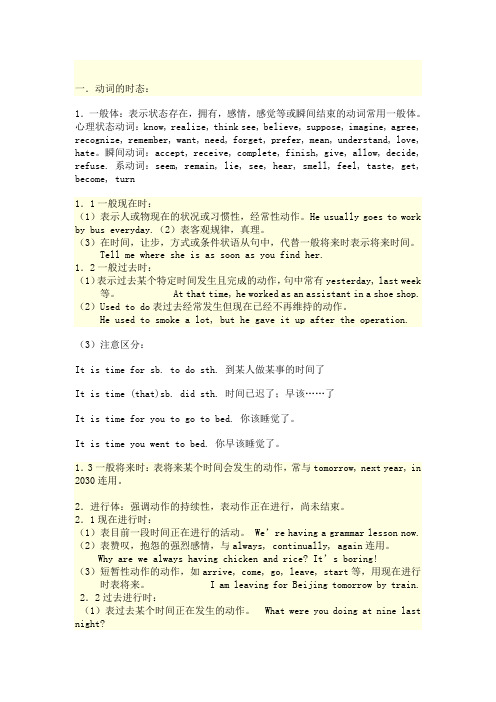
一.动词的时态:1.一般体:表示状态存在,拥有,感情,感觉等或瞬间结束的动词常用一般体。
心理状态动词:know, realize, think see, believe, suppose, imagine, agree, recognize, remember, want, need, forget, prefer, mean, understand, love, hate。
瞬间动词:accept, receive, complete, finish, give, allow, decide, refuse. 系动词:seem, remain, lie, see, hear, smell, feel, taste, get, become, turn1.1一般现在时:(1)表示人或物现在的状况或习惯性,经常性动作。
He usually goes to work by bus everyday.(2)表客观规律,真理。
(3)在时间,让步,方式或条件状语从句中,代替一般将来时表示将来时间。
Tell me where she is as soon as you find her.1.2一般过去时:(1)表示过去某个特定时间发生且完成的动作,句中常有yesterday, last week 等。
At that time, he worked as an assistant in a shoe shop. (2)Used to do表过去经常发生但现在已经不再维持的动作。
He used to smoke a lot, but he gave it up after the operation.(3)注意区分:It is time for sb. to do sth. 到某人做某事的时间了It is time (that)sb. did sth. 时间已迟了;早该……了It is time for you to go to bed. 你该睡觉了。
动词的时态和语态

动词的时态和语态清单1 动词时态概述时态是一种动词形式,它是“时”和“体”的组合。
“时”有现在、过去、将来、过去将来之分;“体”有一般、实行、完成、完成实行之别。
高中阶段主要学习这几种时态:一般现在时,一般过去时,一般将来时,过去将来时,现在实行时,过去实行时,现在完成时,过去完成时,现在完成实行时,过去完成实行时和将来完成时。
清单2 动词时态基本用法一、一般现在时1.表示现在经常性、习惯性的动作或状态.如:⑴We have meals three times a day.(现在的习惯)⑵We always help each other. (现在的状态)2.表示客观真理、科学事实.如:⑴The sun rises in the east and sets in the west. ⑵The earth moves around the sun.3.课时安排、交通时刻表,通常用一般现在时表示将来的动作.如:⑴The plane takes off at 8:30.⑵The school begins on September1st.4.表主语的性质、特征、性格和水平等.如:⑴The music sounds wonderful. ⑵The boy is very brave.5.一般现在时还能够用在if, unless引导的条件状语从句中,由when, before, as soon as, the moment, once引导的时间状语从句中,由no matter what/who/which/when/where/how或whatever, whoever, whichever, whenever, wherever however引导的让步状语从句中,这时主句往往表将来(出现will/shall/can/must)或主句是祈使句.⑴I’ll go with you as soon as I finish my work. ⑵If he comes, I’ll let you know it.⑶I’ll call you the moment he comes. ⑷Work hard and you will succeed.⑸Hurry up or you will be late. (祈使句+and/or+陈述句)注意:如果要表达“意愿”时,从句可用将来时.如:⑴If you will give me a hand, I will appreciate it. ⑵If he will listen to me, I will give him some advice.二、一般过去时1.表示过去经常性、习惯性的动作或状态.如:⑴When I was a boy, I often went there.2.含有与一般过去时连用的时间状语.如:yesterday, last week, …ago, …later等. ⑴He was born in 1995.3.在语境中,往往表示“刚才,在过去”之意,暗示现在已“不再这样”.如:⑴—Nancy is not coming today.—But she promised.⑵—You speak very good French! (2009,四川卷)—Thanks. I __A___ French in Sichuan University for four years.A. studiedB. studyC. was studyingD. had studied⑶—The food here is nice enough.(2009,湖南卷)—My friend ___B__ me a right place.A. introducesB. introducedC. had introducesD. was introducing⑷I was out of town at the time, so I don’t know exactly how it ___B____.(2009,山东卷)A. was happeningB. happenedC. happensD. has happened⑸—I’ve got to go now.(2009,重庆卷)—Must you? I __B__ you could stay for dinner with us.A. thinkB. thoughtC. have thoughtD. am thinking⑹Scientists have many theories about how the universe __A__ into being.(2009,北京卷)A. cameB. was comingC. had comeD. would come4.虚拟语气中,but…⑴I might have given you more help, but I was too busy.三、一般将来时1.will+ 动词原形①表示纯粹的将来.如:Tom will come back next week.②表示事物的必然的趋势或结果.如:Fish will die without water.③临时做出的决定.如:⑴—How about going to see our teacher?—Well, I will go with you.⑵—Ann is in hospital. (2009,江苏卷)—Oh, really? I D know. I ____ go and visit her.A. didn’t; am going toB. don’t; wouldC. don’t; willD. didn’t; will2.be going to+动词原形①表示“计划、打算要做某事”. 如:What are you going to do this afternoon?②通过当前迹象表明将要发生某事.(主语为物)如:Look at the dark clouds. It’s going to rain.3.be about to 动词原形①be about to+动词原形=be on the point of doing something,表示“即将,正要,刚要”,该句型很少与时间状语连用.②通常用句型:be about to…when…,刚要……就……4.be to +动词原形①表示要按计划或安排要做的事. 如:She is to get married.②was/were to do something表示过去计划要做某事,但不表明计划是否被执行,或表示命运(即命中注定要发生的事).was/were to have done something表示未曾实现的计划.如:We were to have told you, but you were not in.③表示情态意义,相当于should, ought to, must, have to.意思是“理应,必须”.You are to report to the police. 你应该报警. What is to be done? 应该怎么办呢?④用于第一人称疑问句,表示征求对方意见,相当于shall.如:What are we to do next? =What shall we do next?5.be doing表示按计划、安排将来要发生的动作或状态,但必须是表示位移的一些动词如come, go, stay, arrive, leave, begin, start等.四、现在实行时①表示此时此刻正在实行的动作,其标志性词有look, listen, now, at present, at this moment.②表示现阶段正在实行的动作.如I am doing my homework this morning.③现在实行时与always, constantly, continually连用,表示说话者含有赞赏、厌恶、批评、遗憾等感情色彩.如:He is always thinking of others first. He is constantly making the same mistake.五、过去实行时(其用法同现在实行时)表示某个时间正在发生、实行的动作。
- 1、下载文档前请自行甄别文档内容的完整性,平台不提供额外的编辑、内容补充、找答案等附加服务。
- 2、"仅部分预览"的文档,不可在线预览部分如存在完整性等问题,可反馈申请退款(可完整预览的文档不适用该条件!)。
- 3、如文档侵犯您的权益,请联系客服反馈,我们会尽快为您处理(人工客服工作时间:9:00-18:30)。
[中考复习]动词的时态和语态一、考点导析初中阶段要求掌握一般现在时、现在进行时、现在完成时、一般过去时、一般将来时等五种时态。
但从近几年各省市中考试题来看,对过去进行时、过去将来时、过去完成时也有考查,也同样重要。
下面咱们来列表比较这八种时初中阶段要求掌握一般现在时、现在进行时、现在完成时、一般过去时、一般将来时等五种时态。
但从近几年各省市中考试题来看,对过去进行时、过去将来时、过去完成时也有考查,也同样重要。
动词时态→意义→标志词→构成(陈述句)→举例验证二、动词时态填空专项练习练习1 选择所给的动词的适当形式填空:1.In China winter _______from November to January.2.Don’t forget __________off the lights when you leave the room.3.Would you please _________out of the window?4.Give the message to the twins as soon as they _______back from school.5.He _______on his coat and went out.6.Older people must _______to politely.7.The professor(教授)is busy. He ________six hours a day.8.Listen! Joan ________in the next room. She often _______there.9._______you brother _______ Japanese?10.It usually _______me about one hour to finish my homework.Part 21.Before he goes to bed he ________the light.2.Li Ming ________his sister with her maths now.3.We’ll go skating if it ________tomorrow.4.The Smith family usually ________lunch at home.5.Please talk in a low voice. The children ____________.6.The old worker __________the students around the factory now.7.Tom __________school earlier than any other students in his class every morning.8.Listen! The telephone ___________.Part 31.Mr Li ________rice to bread, what about you?2.Sometime they go to school by bike, sometimes they _____to school3.My mother usually _______three meals at home.4.She often _______her parents and write back to them in time.5.He is not a good student, because he never _________the books to the library.6.My parents often ________me to visit some places of interest in summer holidays.7.He __________well with his classmates and teachers.8.Who __________Canada in your school?练习2 用所给动词的正确形式填空:1. I love autumn because it ______(be) nice and cool.2. If you ______ (jump) the queue, other people will laugh at you and call you a queue jumper.3. I’ll write to you as soon as I _____(get) to Beijing.4. Do you know that Jim _____(come) tomorrow?5. I don’t remember when Tom ______(arr ive) here yesterday.6. I like what you_______(like).7. It _____(be) time to have lunch.8. Mary said that she ______(come) from England.9. If you ________(not work) hard now, you may fail in the exam this time.10.After I did my homework, I _____(go) to bed.11.I don’t know who they ______(wait) for at the gate of the school that day.12.Please give me a piece of paper ______(write) on.13.I asked Mary if she _____(like) China or not.14.We didn’t stop working until it _____ (begin) to rain.15.As my friend was not at home, I _____(leave) a message for him.16.I’ll write to you as soon as I _____(get) to Jinan.17.Can you tell me how many students there ______(be) in you class?18.He asked where the nearest bus stop _____(be).19. I have nothing ______(say) about this problem.20. Please write down what she _____ (say).21. When he saw Kate in the street, he stopped ______ (talk) to her.22. What shall we do if it _____ (rain) tomorrow?23. Mr Wu has taught in this school since he ______(come) to Beijing.24. we’ll ring you up on the telephone as soon as we _____(reach) Beijing.25. They _____(look) the same as they are twins.26. Y ou must look around before you______(cross) the road.27. He _________(live) here since he came to Shanghai.28. He wants to know who _____(ring) him up just now.29. I want to know whether Mr. Brown _______(come) back.30. He showed us how _____(use) the machine.练习3 用动词适当形式填空:1. My friend and __(go) to America two months ago . But I __(not hear ) from him yet .2.Now my uncle __(not be ) in Shanghai . He __(go) to Beijing .3.I wonder if my mother _(be)back in a week .4.When I _(see) him yesterday , he __(work) in the garden .5.The boy asked if the Sun _(set) in the west .6.He didn't go to the film because he _(see) it before .7.Ask her come if she _(have ) time tomorrow .8.There _(be) an important meeting soon .9.When we _(get) there ,Tom _(go) away .“I ___(read ) now ." He asked .10.He said he __(visit ) his teacher next week .11.Our teacher said the earth __(be) round .12 Hurry up , or you __( miss ) the train .13 Light __(travel ) much faster than sound .14 My family __(watch ) TV from seven to nine last night .15 By the end of 1992 ,Henry _(collect ) more than 800 stamps .16 When ___your mother _(have) breakfast ?17 Look out ! The wall __(fall) down .18 What _you __(do) this time yesterday ?19 __ I __(get ) you today's newspaper ?20 These young people __(skate ) on the real ice now .21 It _(rain) hard . Let's stay here till the rain stops .22 Tom _(lift) his eyes from the book and _(look) out of the window . It _(snow) still .23 I __(see) him three months ago and I _(not see) him again since then .24 My father __(buy) me an English book last month .But I _(not read) it yet .25 Buy the time he __(die) , he __(work) in the factory for thirty years .26 If you __(want) a dictionary , I _(get) one for you .练习4 选择填空1 I __ in the street when it began to snow .A walkedB was walkingC walk2 When the class was over , most of the boys __ to the play ground to play football . A were goingB wentC had gone3 By the end of last term , we _ 20 English songs .A have learnedB had learnedC learnt4 John told me that he _ the film twice .A had seenB has seenC saw5 I will give the message to her as soon as she _ back .A will comeB comesC came6 In those days there __ no schools in that village .A wasB wereC is7 Tom forgot what he _ .A had saidB has saidC said8 I _ Li Ying since she _ our school two years ago .A haven't seen ,leftB hadn't seen ,leftC didn't see ,left9 What are you doing under that table ? I _ my pen .A am looking forB look forC looked for10 His uncle _ for London the day after tomorrow .A leftB is leavingC leaves11 His grandma __ for 13 yearsA has been deadB has diedC was dead12 __ the party _ when he came ?A Was ,begunB Had , begunC Would ,begin13 I'll go with you as soon as I __ my homework .A will finishB finishC finishes14 If it ____ tomorrow , I won't go to the cinema .A will rainB rainsC rain15 She is going to be a nurse when she ___ up .A will growB growsC grow16 He __ this colour TV set for half a year .A usedB usesC has used17 I __ the army for two years .A has joinedB have been inC have been18 By the end of last term ,we ___ four English songs .A have seenB had seenC saw19 My father usually ____ breakfast .A cookB cooksC cooking20 Do you know why an apple ___ down and not up ?A fallsB fallingC fell21 The twins ___ Chinese in an evening school now .A studyB to studyC are studying22 We often ___ this game when we were young .A playB playedC playing23 She looks better now . She __ terrible at this time yesterday .A feltB was feelingC feels24 When I got up this morning , it _____ .A was rainingB rainedC rains25 Y ou ___ at home with me .A had better stayB have better stayC had better stay not26 I'm sorry to have kept you __ .A waitedB waitC waiting27 I have finished ___ two English novels since I came here .A to readB readC reading28 He ___ to Nanjing . He left this morning .A has goneB has beenC goes29 The train has __ for ten minutes .A has goneB has leftC has been away30 Don't ___ with the glass .It's dangerous .A playB makeC clean31 Don't forget __ in your maths exercises tomorrow .A hardB to handC handing32 The teacher told the students __ in class .A didn't talkB not to talkC talk33 It is not easy __ a foreign language .A to learnB learnC learing34 Would you please show us where __ ?A going toB to goC to go to35 The man down stairs asked Peter ___ down the radio a bit .A to turnB turnC turning36 They heard the girl __ in the next room just now .A to singB sing c singing37 He got up very early __ the early bus .A to catchB catchingC caught38 May I smoke here ? No , you ____ .A mustn'tB can'tC may not39 I would like ___ your ten-speed bicycle .A to seeB seeingC see40 I'll lend you my dictionary , but you can only __ it for one day .A keepB borrowC have41 ___ carefully and try to __ what he is sayingA Listen to , hearB Listen , hearC Listen , listen.动词与动词的时态答案练习1 Part 1sts 2 to turn 3 not look 4 come 5 put 6 be spoken 7 sleeps 8. sings 9 Does ,speak 10 takes答案错误:第8小题应改为is singing , singsPart 21 had turned2 is helping3 doesn’t snow4 have5 are sleeping6 are sho wing7 gets to8 is singing答案错误:第1小题应改为had turned offPart31 prefers2 walk3 has4 hears from5 returning6 take7 gets on8 come from答案错误:第5小题应改为returns练习21.get 2 jump 3 get 4 will come 5 arrived 6 like 7 is 8 came 9 don’t work 10 went 11 waited 12 to write 13 liked 14 began 15 left 16 get 17 are 18 was 19 to say 20said 21 to talk 22 rains 23 came 24 reach 25 look 26 cross 27 has lived 28 rang 29 would come 30 to use答案错误:29小题应改为will come. 或将原题改为I wanted to know whether Mr. Brown wouldcome back练习31.went ; haven’t heard 2 isn’t has gone 3 will be 4 saw was working 5 sets 6 has see 7 has 8 will be 9 got has gone 10 am reading 11 is 12 will miss 13 travels 14 were watching 15 had collected 16 does have 17 is falling 18 was doing 19 Shall get 20 are skating 21 is raining 22 lifted looked was snowing 23 saw haven’t read 24 bought 25 died had worked 26 want will get答案错误:6小题应改为had seen9小题应改为got ,had gone练习41-----5 B B B A B 6-----10 B A A A B 11------15 ABC BB 16-----20 CBBBA21-----25 CBAAA26 ------30 CCACA31-----35 BBABA36------41 CAAAAB谢谢更正错误!。
